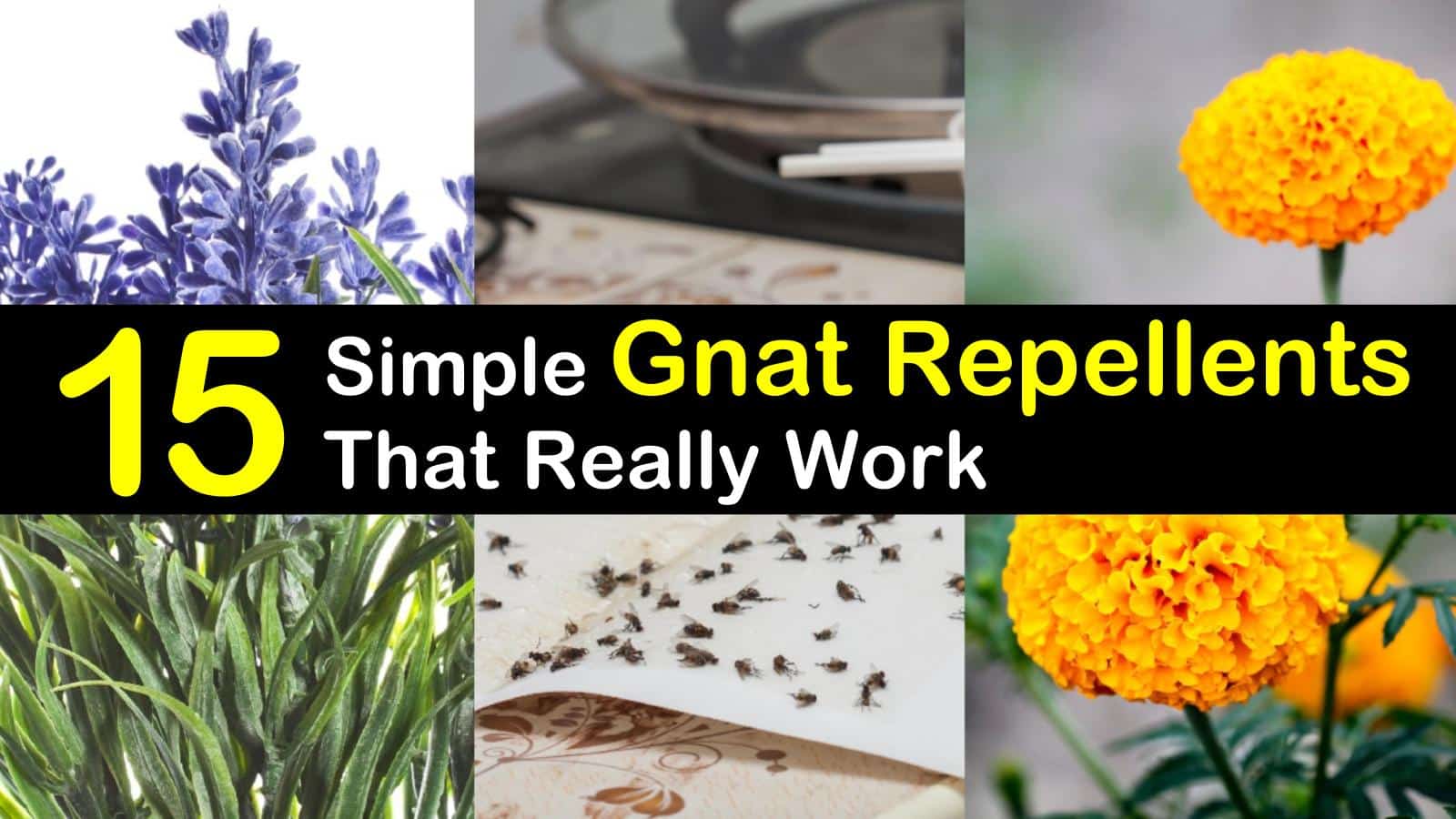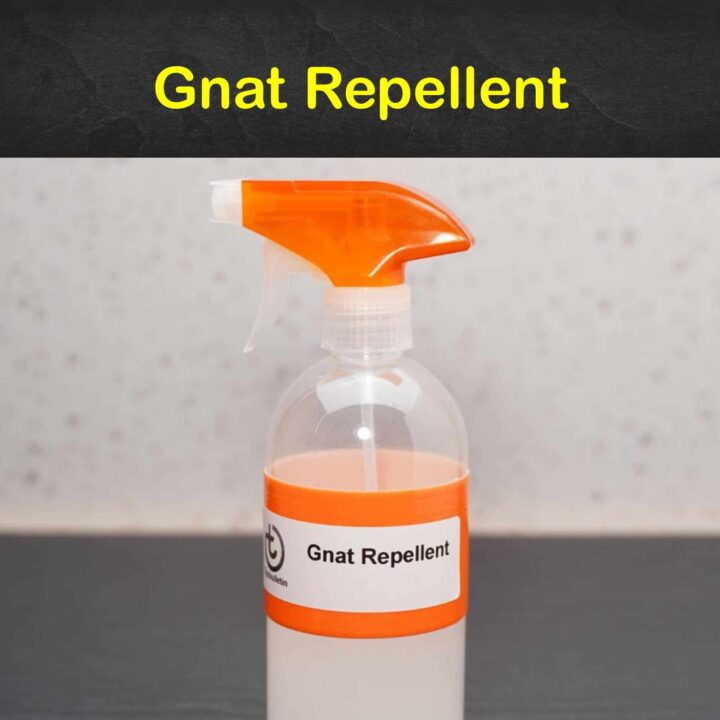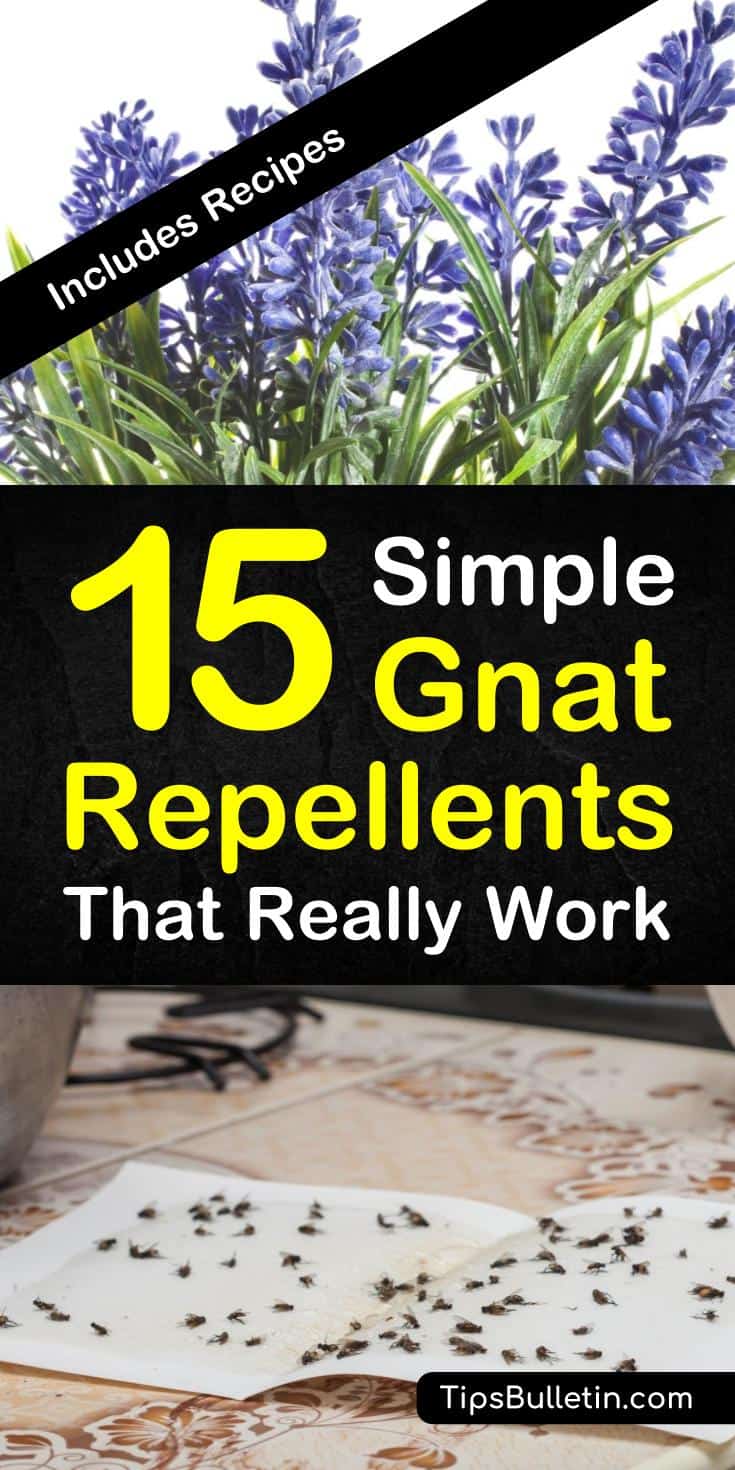It’s no secret that those tiny flying insects known as gnats are annoying. The obnoxious buzzing alone is enough to drive anyone crazy. Unfortunately, gnats are good at finding their way inside and invading your home and destroying your plants. Fortunately, you can learn how to repel gnats with homemade gnat repellents.
While the different types of gnats are harmless for humans, the last thing you want to do is have to deal with a gnat infestation. When it comes to how to keep gnats away, most people turn to use commercial insect repellent that contains harsh chemicals, because they are readily available and it’s what everyone else uses.
However, if you have concerns about using a gnat spray that contains toxic chemicals, there are many natural pest control remedies to get rid of flies and gnats in a bathroom that are safe for kids and pets. Here’s how to keep gnats away using natural ingredients.

How to Get Rid of Gnats Inside
While there are two common types of gnats, fruit flies and fungus gnats, but there are several other types that can infest your home and yard. While most of these gnats are harmless, the very presence of these tiny, pesky insects can leave you feeling a bit twitchy.
Thankfully, there are a handful of clever ways for how to repel flies and gnats in your house that require nothing more than a few simple, everyday ingredients that you probably already have in your home.
Apple Cider Vinegar Trap for Gnats
The sweet smell of apple cider vinegar can be used to attract gnats that are swarming around your house. You can easily create your effective gnat trap with the use of a jar, some dish soap, and some apple cider vinegar. Keep flies and gnats away with this natural home remedy.
Place the vinegar, sugar, and dish soap in the jar, then pour the water in the jar, being sure to mix well. Cover the opening of the container with the plastic wrap and use the rubber band to secure it in place. Ensure that the plastic wrap is stretched tight over the opening.
Using a toothpick, make several small holes in the plastic wrap. Place the gnat trap in any area around your home where you have a gnat infestation to get rid of them.
The vinegar will attract the gnats to the jar and will get in through the small holes, but they won’t be able to get back out. Every few days, replace the vinegar. Keep the vinegar trap out until you get rid of your gnat problem.
Banana Trap
Mashed-up bananas is another excellent natural way to keep gnats away. This trap is similar in nature to the apple cider vinegar trap. Instead of putting the apple cider vinegar in a jar, place a mashed-up banana at the bottom. Again, cover the opening of the jar with plastic wrap and secure it with a rubber band.
Poke a few holes in the top of the Saran wrap with a toothpick and place it in an area where you are having a gnat problem. After a couple of days dispose of the banana, and replace it with a new one if you still have a problem.
Homemade Sticky Trap for Gnats
Another one of the natural gnat repellents that you can easily make yourself is a homemade sticky trap. A homemade sticky gnat trap is a natural home remedy for gnats.
To make your sticky gnat trap, use a yellow or other brightly colored index card or piece of plastic and attach it to a stick. Smear the card with honey to attract the gnats. Place the trap in a strategic location around your kitchen and home to trap and kill the gnats.

Kill Gnats with Tea Tree Oil
You can make your natural gnat repellent with a combination of dish soap and tea tree oil. The tea tree oil contains natural insecticidal properties that will quickly kill off adult gnats and fruit flies, as well as the gnat larvae and eggs.
The natural pesticides found in tea tree essential oils kill various species of flies is a natural mosquito repellent and will keep you from getting gnat bites.
Fill a spray bottle with the water. Add the soap and tea tree oil and shake to mix. Spray the solution directly onto the gnats and fruit flies to kill them naturally and safely.
You can also spray the mixture in the cracks and crevices around your home where you think gnats might have laid their eggs. Use the spray until you no longer have a problem with gnats.
If you have a problem with drain flies, you can put several drops of the tea tree essential oil directly into the drain to kill and gnat eggs or larvae that are in there. To ensure that all the edges of the pipe are covered, make sure to put enough of the tea tree oil down the drain.
Once you pour the tea tree oil down the drain, leave it overnight, then pour a large pan of boiling water into the pipe to ensure that all of the larvae and eggs are destroyed.
Peppermint Oil Spray
Peppermint essential oil is a homemade gnat repellent that can be used to deal with your indoor and outdoor gnat problem, as well as a bee repellent for humans. The active components in the oil help to repel gnats and fruit flies along with effectively killing off their eggs and larvae.
Fill the spray bottle with the water, dish soap, and peppermint oil. Use the homemade gnat spray directly on the fruit flies and gnats as well as in areas where they might be living.
You can also use the peppermint spray to treat the houseplants that have gnats flying around them. Just spray the base of the plants as well as the soil to prevent adult gnats from laying their eggs.
Neem Oil
Neem oil is another excellent repellent for gnats and will also kill aphids. Neem oil works to disrupt the gnat insect’s ability to lay eggs, as well as disrupting the development of their larvae. This natural neem oil spray is safe to use around plants, but strong enough to eliminate the gnat larvae.
Combine the Castile soap and neem oil in the spray bottle. Fill the container with the water. Replace the lid and shake well to mix the ingredients. Spray the roots of the plants that are infected with gnats.
This will kill the gnat larvae and eggs that are under the top layer of the moist soil. To execute the adult fruit flies and gnats, spray the leaves of the plants. This spray is also effective against spiders and mosquitoes.
How to Get Rid of Gnats in Your Yard
Along with being a pest inside, gnats can be extremely aggravating when you are outside trying to enjoy your yard. Damp areas and spoiling organic material attract gnats to garbage cans and people when they are enjoying the outdoors.
Even though gnats are small than mosquitoes, certain kinds of gnats, like buffalo gnats, also known as black flies, biting midges, sand flies, and stable flies will eat you. This makes learning how to get rid of outdoor gnats naturally, extremely important.
Controlling Non-Biting Gnats
Controlling the non-biting gnats outdoors is often needed because their outside breeding and developmental sources tend to produce large populations of the annoying pest that will eventually get inside if the proper precautions aren’t made.
To eliminate their outdoor breeding sites, it’s essential to allow moist areas around your yard to dry out. This includes all your outdoor potted plants, roof gutters that may be clogged, sites near the downspouts, near your air conditioner, thick mulch, compost piles, and accumulated piles of leaves, grass clippings, and other garden debris.
It is also essential to repair leaking pipes that allow water and sewage to accumulate, cleaning up fallen fruit, avoiding overwatering your plants and keeping your garbage cans and other trash containers covered and clean.
Controlling Biting Gnats
Biting gnats can cause medically-related issues, like allergic reactions to their bites, and some can even spread diseases. The various kinds of biting gnats generally affect those living around moist habitats, coastal marshes, freshwater inlets, and springtime pools of water.
The best way to reduce the impact of these biting gnats is to schedule your outdoor activities when they are less active. Most biting gnats are active during the evening hours when there is little or no wind. Staying inside during this time will help to prevent you from dealing with buffalo gnat bites.
If you do need to be outside when the gnats are active, be sure to cover up to reduce exposure to biting gnats. Be sure to wear long sleeves, long pants, and hats when you are outside. You can also use fans on your patio or deck to keep the biting gnats away.
Since gnats are small, weak fliers, using ceiling fans and other fans will prevent them from invading your outdoor space. You can also use biting gnat repellent, like DEET lotion or citronella oil to keep the biting gnats at bay.
Plants that Repel Gnats
If you don’t want to have to wear a chemical gnat repellent every time you head outside, you can also try adding the following gnat repellent plants to your garden and areas around your home.
Geraniums
This colorful, fragrant flower contains citronella, which is a smell that drives gnats away. Citronella is the main ingredient in many of the commercial repellent sprays and candles on the market.
You can place these plants in pots around your patio, or plant them directly in soil that drains well and is in full sun.
Lemon Thyme
Another plant that contains citronella, the lemon thyme plant is a perennial herb that boasts yellow and green, lemon-scented leaves. This plant thrives in the sun, so you’ll want to plant it in an area that receives full or partial sunlight. Lemon thyme not only works well for repelling gnats, but you can use it in the kitchen to bring lemon flavor to all your cooking.
Lavender
Lavender flowers can be either, white, purple, or lavender, and the aroma that the plant produces will repel gnats. You’ll want to place the lavender plants in an area that receives full sun, and can either be planted in the ground around your yard or put in large potted planters and kept anywhere you want to avoid gnats.
Mexican Marigold
The Mexican marigold produces clusters of cream-colored and yellow flowers, and the foliage has a musty odor that gnats and other flying insects dislike.
Not only will this plant drive gnats away, but it also kills harmful nematodes that may be in the soil. The Mexican marigold likes the sun, so you should plant them in locations around the yard that receive full sun, as well as in ground that is mildly alkaline to acidic.
How to Keep Gnats Away from Your Face
There isn’t much more annoying than being attacked by a swarm of gnats when you step outside. While they are relatively harmless, they love to swarm your face and get dangerously close to your eyes and ears. Fortunately, there are some things you can do if you want to know how to repel gnats from your face.
Use a Vanilla Repellent
Vanilla is one of the best home remedies for gnats because they can’t stand the sweet smell. To keep gnats from swarming your face, apply a vanilla concentrate to any area of your skin that is exposed.
Combine vanilla and water in a small bowl and stir to ensure the ingredients are properly blended. Dip a cotton ball in the mixture and apply the repellent to the exposed areas of your body. To ensure that you aren’t allergic to the vanilla, test the repellent on a small section of your exposed skin.
Use Dryer Sheets
Many of the fabric softener sheets on the market today smell like lavender, lemon balm, geranium, and other gnat repellent scents. So, if you want to keep gnats from swarming your face when you are outside, you can put a dryer sheet in your pocket.
Since the fabric softener sheets contain chemicals, you won’t have to worry about attracting hummingbirds, bees, or butterflies.
Use Essential Oils
Essential oils have effectively been used to repel gnats and other insects for years. They are rich in potent aromatic compounds that make them great for repelling gnats. While these scents are pleasing to us, they are incredibly unpleasant to insects, including gnats. Here are several useful essential oils for repelling gnats.
Peppermint Oil
Slightly minty and peppery, peppermint oil is a common, active ingredient in many of the commercial insect repellents on the market. Gnats detest the strong smell of insects and come in handy as a gnat repellent. Dilute the peppermint oil with a carrier oil like olive or coconut oil because it can be harsh on the skin.
Add the water to the spray bottle. Then add the witch hazel and vodka to the container to help disperse the essential oils in the water and to help the scent stay longer on your skin.
Add the essential oils and shake well to combine. Before each application, shake the bottle, then spray the homemade bug spray on the exposed areas of your skin before going outside.
Cedarwood Oil
The sweet aroma of cedarwood is especially annoying to most insects and animals. This makes cedarwood the best insect repellent against gnats.
It is used in many of the best gnat repellents, including commercial insect repellents. You can use it in the diffuser or dilute it with a carrier oil, like coconut or olive oil, and use it on your exposed skin when you are outside.
Geranium Oil
Just like the plant, geranium oil is excellent for keeping gnats from swarming your face when you are out in the yard. Along with keeping gnats at bay, geranium essential oil has antibacterial properties, which will also help to combat the presence of gnats.
Eucalyptus Oil
Not only will the strong smell of eucalyptus oil leave you and your house smelling great, but it will also repel gnats. To use the oil to deal with a gnat infestation in your home, place a few drops in a diffuser and let it run all day. You can also combine it with a few other essential oils to create an effective gnat repellent.
Pour all of the oils into a spray bottleand add the water and the vinegar. Replace the cap and shake. Spray the area to keep the gnats away.
Rosemary Oil
Gnats hate the soothing aroma of rosemary, so placing rosemary around the house can be a great way to get rid of gnats. You can also add it to water and spray it around your yard to keep the gnats away.
Gnats are extremely annoying insects that love to hang around your plants and yard. If you want to rid your house and yard of gnats effectively, try these effective methods for repelling gnats.
With these easy techniques that use simple ingredients, you can eliminate any gnat infestation that you might come across and enjoy an insect free house and yard.
Recipe for Gnat Repellent

Gnat Repellent
A natural solution for pesky gnats and fruit flies.
Materials
- 1/2 tsp dish soap
- 8 ounces tap water
- 13 drops tea tree essential oil
Tools
- 12-ounce glass sprayer bottle
- Measuring cup
- Teaspoon
Instructions
- Pour the liquids into the bottle.
- Shake to combine without making a lot of suds.
- Spritz gnats and their eggs if you see them.
Notes
Use a glass bottle, as essential oils degrade plastic over time.

We hope you enjoyed learning about the simple gnat repellents that work. If you found this gnat repellent tips and recipes helpful, please feel free to share these gnats control tips with everyone you know.